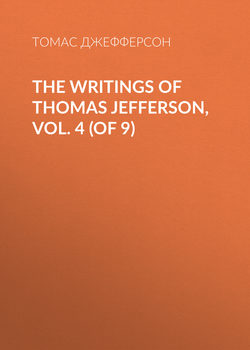Читать книгу The Writings of Thomas Jefferson, Vol. 4 (of 9) - Томас Джефферсон, Thomas Jefferson - Страница 14
TO –
ОглавлениеAugust 11, 1793.
Dear Sir,—I wrote you last on the 3d instant. Yours of July 30th, came to hand yesterday. Besides the present which goes by post, I write you another to-day to go by Mr. D. Randolph, who sets out the day after to-morrow for Monticello, but whether by the direct route or via Richmond is not yet decided. I shall desire that letter to be sent to you by express from Monticello. I have not been able to lay my hands on the newspaper which gave a short but true view of the intention of the proclamation; however, having occasion to state it in a paper which I am preparing, I have done it in the following terms, and I give you the very words from the paper, because just as I had finished so far, 812.15. called on me. I read it to him. He said it presented fairly his view of the matter. He recalled to my mind that I had, at the time, opposed its being made a declaration of neutrality on the ground that the Executive was not the competent authority for that, and, therefore, that it was agreed the instrument should be drawn with great care. My statement is in these words: "On the declaration of war between France and England, the United States being at peace with both, their situation was so new and unexperienced by themselves, that their citizens were not, in the first instant, sensible of the new duties resulting therefrom, and of the laws it would impose even on their dispositions towards the belligerent powers. Some of them imagined (and chiefly their transient sea-faring citizens) that they were free to indulge those dispositions, to take side with either party, and enrich themselves by depredations on the commerce of the other, and were meditating enterprises of this nature, as was said. In this state of the public mind, and before it should take an erroneous direction difficult to be set right, and dangerous to themselves and their country, the President thought it expedient, by way of Proclamation, to remind our fellow-citizens that we were in a state of peace with all the belligerent powers; that in that state it was our duty neither to aid nor injure any; to exhort and warn them against acts which might contravene this duty, and particularly those of positive hostility, for the punishment of which the laws would be appealed to, and to put them on their guard also as to the risks they would run if they should attempt to carry articles of contraband to any." Very soon afterwards we learnt that he was undertaking the fitting and arming vessels in that port, enlisting men, foreign and citizens, and giving them commissions to cruise and commit hostilities against nations at peace with us, that these vessels were taking and bringing prizes into our ports, that the consuls of France were assuming to hold courts of admiralty on them, to try, condemn and authorize their sale as legal prizes, and all this before Mr. Genet had presented himself or his credentials to the President, before he was received by him, without his consent or consultation, and directly in contravention of the state of peace existing and declared to exist in the President's proclamation, and which it was incumbent on him to preserve till the Constitutional authority should otherwise declare. These proceedings became immediately, as was naturally to be expected, the subject of complaint by the representative here of that power against whom they would chiefly operate, &c. This was the true sense of the proclamation in the view of the draughtsman and of the two signers; but H. had other views. The instrument was badly drawn, and made the P. go out of his line to declare things which, though true, it was not exactly his province to declare. The instrument was communicated to me after it was drawn, but I was busy, and only run an eye over it to see that it was not made a declaration of neutrality, and gave it back again, without, I believe, changing a tittle. Pacificus has now changed his signature to "no Jacobin." Three papers under this signature have been published in Dunlap. I suppose they will get into Fenno. They are commentaries on the laws of nations and on the different parts of our treaty with France. As yet they have presented no very important heresy. Congress will not meet till the legal day. It was referred to a meeting at my office to consider and advice on it. I was for calling them. Kin. against it. H. said his judgment was against it. But he would join any two who should concur so as to make a majority either way. R. was pointedly against it. We agreed to give our opinions separately, and though the P. was in his own judgment for calling them, he acquiesced in the majority. I pass on to the other letter; so adieu. Yours affectionately.
